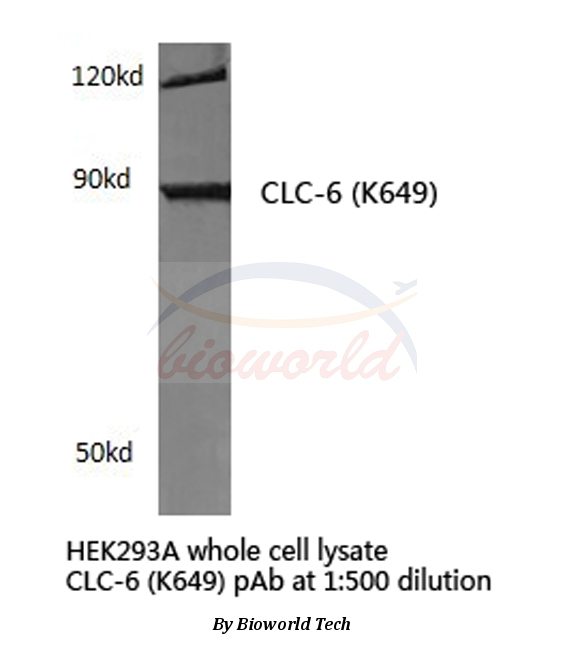Product Name :
CLC-6 (K649) polyclonal antibody Background :
The family of voltage-dependent chloride channels (CLCs) regulate cellular trafficking of chloride ions, a critical component of all living cells. CLCs regulate excitability in muscle and nerve cells, aid in organic solute transport and maintain cellular volume. The genes encoding human CLC-1 through CLC-7 map to chromosomes 7, 3q26, 4q32, Xp22, Xp11, 1p36 and 16p13, respectively. CLC-1 is highly expressed in skeletal muscle. Mutations in the gene encoding CLC-1 lead to myotonia, an inheritable disorder characterized by muscle stiffness and renal salt wasting. CLC-2 is highly expressed in the epithelia of several organs including lung, which suggests CLC-2 may be a possible therapeutic target for cystic fibrosis. CLC-3 expression is particularly abundant in neuronal tissue, while CLC-4 expression is evident in skeletal and cardiac muscle as well as brain. Mutations in the gene encoding CLC-5 lead to Dent’s disease, a renal disorder characterized by proteinuria and hypercalciuria. CLC-6 and CLC-7 are broadly expressed in several tissues including testes, kidney, brain and muscle. Product :
Rabbit IgG, 1mg/ml in PBS with 0.02% sodium azide, 50% glycerol, pH7.2 Storage&Stability :
Store at 4°C short term. Aliquot and store at -20°C long term. Avoid freeze-thaw cycles. Specificity :
CLC-6 (K649) polyclonal antibody detects endogenous levels of CLC-6 protein. Immunogen :
Synthetic peptide, corresponding to amino acids 620-680 of Human CLC-6. Conjugate :
Unconjugated Modification :
Unmodification
CLC-6 (K649) polyclonal antibody Background :
The family of voltage-dependent chloride channels (CLCs) regulate cellular trafficking of chloride ions, a critical component of all living cells. CLCs regulate excitability in muscle and nerve cells, aid in organic solute transport and maintain cellular volume. The genes encoding human CLC-1 through CLC-7 map to chromosomes 7, 3q26, 4q32, Xp22, Xp11, 1p36 and 16p13, respectively. CLC-1 is highly expressed in skeletal muscle. Mutations in the gene encoding CLC-1 lead to myotonia, an inheritable disorder characterized by muscle stiffness and renal salt wasting. CLC-2 is highly expressed in the epithelia of several organs including lung, which suggests CLC-2 may be a possible therapeutic target for cystic fibrosis. CLC-3 expression is particularly abundant in neuronal tissue, while CLC-4 expression is evident in skeletal and cardiac muscle as well as brain. Mutations in the gene encoding CLC-5 lead to Dent’s disease, a renal disorder characterized by proteinuria and hypercalciuria. CLC-6 and CLC-7 are broadly expressed in several tissues including testes, kidney, brain and muscle. Product :
Rabbit IgG, 1mg/ml in PBS with 0.02% sodium azide, 50% glycerol, pH7.2 Storage&Stability :
Store at 4°C short term. Aliquot and store at -20°C long term. Avoid freeze-thaw cycles. Specificity :
CLC-6 (K649) polyclonal antibody detects endogenous levels of CLC-6 protein. Immunogen :
Synthetic peptide, corresponding to amino acids 620-680 of Human CLC-6. Conjugate :
Unconjugated Modification :
Unmodification
-
 Western blot (WB) analysis of CLC-6 (K649) polyclonal antibody in extracts from HEK293A cells.
Western blot (WB) analysis of CLC-6 (K649) polyclonal antibody in extracts from HEK293A cells.
Bioworld Biotech only provide peptides for our antibodies and do not provide additional peptide customization services.
Price/Size :
USD 368/1mg/vial
Tips:
For phospho antibody, we provide phospho peptide(0.5mg) and non-phospho peptide(0.5mg).Describe :
Blocking peptides are peptides that bind specifically to the target antibody and block antibody binding. These peptide usually contains the epitope recognized by the antibody. Antibodies bound to the blocking peptide no longer bind to the epitope on the target protein. This mechanism is useful when non-specific binding is an issue, for example, in Western blotting (WB) and Immunohistochemistry (IHC). By comparing the staining from the blocked antibody versus the antibody alone, one can see which staining is specific; Specific binding will be absent from the western blot or IHC performed with the neutralized antibody.Formula:
Synthetic peptide was lyophilized with 100% acetonitrile and is supplied as a powder. Reconstitute with 0.1 ml DI water for a final concentration of 10 mg/ml.The purity is >90%,tested by HPLC and MS.
Storage:
The freeze-dried powder is more stable. For short time at 2-8°C. For long term storage store at -20°C.
Note :
This product is for research use only (RUO only). Not for use in diagnostic or therapeutic procedures.
 CLC-6 (K649) polyclonal antibody
CLC-6 (K649) polyclonal antibody  Datasheet
Datasheet COA
COA MSDS
MSDS SHIP
SHIP